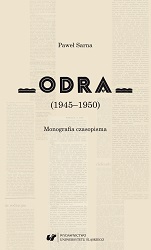„ODRA” (1945–1950) Monografia czasopisma
„ODRA” (1945–1950) A monograph of the journal
Author(s): Paweł Sarna
Subject(s): Politics / Political Sciences, Politics, Economic policy
Published by: Wydawnictwo Uniwersytetu Śląskiego
Keywords: PRL; Wilhelm Szewczyk; „Odra”; „Odrodzenie”; „Kuźnica”;„Tygodnik Powszechny”;
Summary/Abstract: This volume presents the history and role of “Odra”, a social-cultural journal founded by journalists and writers gathered around Wilhelm Szewczyk. The journal was published in Katowice in the years 1945–1950, first as a biweekly and since 1946, as a weekly. The legacy of the journal is of particular value. Within a few years, it became one of the most important social-cultural periodicals in post-war Poland. This volume traces its development; it consists of six parts. The first part presents the social and political background of the journal. In the years that followed World War Two, the social and cultural press was a major forum for discussion, in particular, for debates on culture. The most important debates of the time included the battle for the Polish intelligentsia, in which the “Odra” journal participated. Such disputes were, to a considerable extent, a substitute for political topics, that is, for problems which could not be explicitly addressed.Journals that were published at that time had one thing in common: they were all subject to censorship. However, it must be remembered that censorship was merely a tool in the hands of the party. Because “Odra” was regarded as an oppositional journal, censors read it very closely. As a result of their intervention, the published versions of articles were sometimes quite remote from their original forms.The second part of the volume presents the methodological assumptions of the project. The research comprises a quantitative analysis, that is, an analysis of the content, and a qualitative analysis of the material. In methodological terms, the study of the role and significance of the “Odra” journal in the years 1945–1950 is situated at the junction of literary studies and media studies.The third part outlines the main characters of the narration. Protagonists of the “Odra” journal included indigenous inhabitants and settlers. Journalists stood up for those who were part of a community of suffering: harmed by bandits and the system, often rejected and pushed to the edge of the political and cultural life. In 1946, Zbyszko Bednorz, one of the regular collaborators of the journal, wrote that in the awareness of Poles, the Western and Northern Territories still remained occupied and strange. In fact, for a long time, they continued to be explored and colonised. Moreover, they had a special place on the map of fear and terror because of the robberies by Soviet soldiers, the Citizens’ Militia, and common bandits.It was an intention of “Odra” editors to shape the journal in such a way so that it was perceived as both recording and commenting on all important events that took place in post-war Germany. The issue of Polish-German relations was analysed in particular detail, taking into consideration events of the most remote past. The most active commentator on the German problem was Wilhelm Szewczyk, the editor-in-chief, who wrote about post-war Germany and Polish-German relations in the column entitled Co robią Niemcy? [What are the Germans doing?]. The narration about Poland’s western neighbour in the texts published in the Co robią Niemcy? series forms a recognisable pattern: it begins with a simple juxtaposition between “us” and “them” in the first post-war years; later, however, this opposition dissolves so that the division blurs, a change influenced to a considerable extent by the events in both German states and by the political course taken by the Polish authorities.The book argues that an important asset of the journal was its programme, which is described and analysed in the fourth part of the volume. “Odra” drew from the national thought of the interwar period. However, it must be emphasised that it cannot be suspected of having supported nationalist causes.Journalists of the “Odra” journal proposed a cultural programme for – to use the terminology of the time – the Recovered Territories. They were actively involved in polemics with Kuźnica, a journal promoting Marxist thought and an important title on the national scale.A considerable part of the content of the journal was concerned with analyses of literary texts, which are discussed in the last two parts of the volume. “Odra” carried texts by widely respected writers, including those whose influence on the shape of Polish literature and culture was growing with time: Tadeusz Różewicz, Tymoteusz Karpowicz, and Stanisław Lem. Browsing through the issues of “Odra”, one will easily notice that the literary themes and texts often directly corresponded with the content of articles which discussed other issues. Poetry and prose frequently functioned as illustrations of various problems addressed by journalists. “Odra” editors used this strategy, for instance, to raise the readers’ interest in the problem of Polish-German and Polish-Czechoslovakian relations.Historians of literature and media scholars often appeal for more research being done into the periodical press in general, and into the period immediately following World War Two in particular, when the new post-Yalta order was forming. Despite the abundance of source material, studies of the subject are scarce. So far, no special monograph devoted solely to the “Odra” journal has been published. It is hoped that the present volume will fill this gap.
Series: Politologia i Ekonomia polityczna
- E-ISBN-13: 978-83-226-3659-6
- Print-ISBN-13: 978-83-226-3658-9
- Page Count: 324
- Publication Year: 2019
- Language: Polish
- eBook-PDF
- Table of Content
- Introduction

